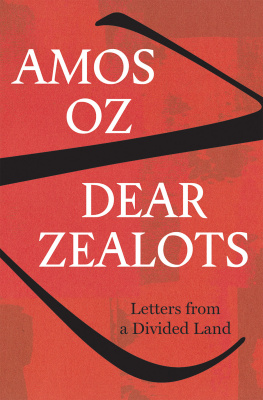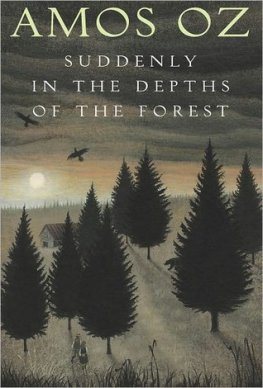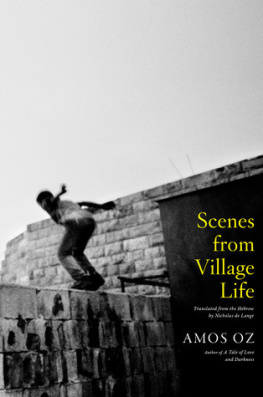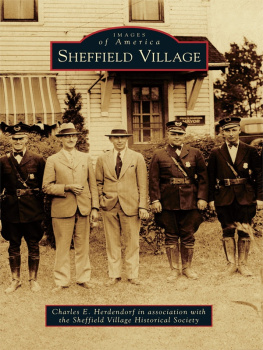First U.S. edition
Copyright 2011 by Amos Oz
Translation copyright 2011 by Nicholas de Lange
All rights reserved
For information about permission to reproduce selections from this book,
write to Permissions, Houghton Mifflin Harcourt Publishing Company,
215 Park Avenue South, New York, New York 10003.
First published in Hebrew as Tmunot Mihayei Hakfar
First published in Great Britain by Chatto & Windus, 2011
www.hmhbooks.com
Library of Congress Cataloging-in-Publication Data
Oz, Amos.
[Temunot me-haye ha-kefar. English]
Scenes from village life / Amos Oz ; translated from the Hebrew by
Nicholas de Lange.1st U.S. ed.
p. cm.
"First published in Hebrew as Tmunot mihayei hakfar. First published in
Great Britain by Chatto & Windus, 2011"T.p. verso.
ISBN 978-0-547-48336-8
1. Oz, AmosTranslations into English. I. De Lange, N. R. M. (Nicholas
Robert Michael), date. II. Title.
PJ 5054. O 9 T 4613 2011
892.4'36dc22 2011016055
Book design by Brian Moore
Printed in the United States of America
DOC 10 9 8 7 6 5 4 3 2 1
Heirs
1
THE STRANGER WAS not quite a stranger. Something in his appearance repelled and yet fascinated Arieh Zelnik from first glance, if it really was the first glance: he felt he remembered that face, the arms that came down nearly to the knees, but vaguely, as though from a lifetime ago.
The man parked his car right in front of the gate. It was a dusty, beige car, with a motley patchwork of stickers on the rear window and even on the side windows: a varied collection of declarations, warnings, slogans and exclamation marks. He locked the car, rattling each door vigorously to make sure they were all properly shut. Then he patted the hood lightly once or twice, as though the car were an old horse that you tethered to the gatepost and patted affectionately to let him know he wouldn't have long to wait. Then the man pushed the gate open and strode toward the vine-shaded front veranda. He moved in a jerky, almost painful way, as if walking on hot sand.
From his swing seat in a corner of the veranda Arieh Zelnik could watch without being seen. He observed the uninvited guest from the moment he parked his car. But try as he might, he could not remember where or when he had come across him before. Was it on a foreign trip? In the army? At work? At university? Or even at school? The man's face had a sly, jubilant expression, as if he had just pulled off a practical joke at someone else's expense. Somewhere behind or beneath the stranger's features there lurked the elusive suggestion of a familiar, disturbing face: was it someone who once harmed you, or someone to whom you yourself once did some forgotten wrong?
Like a dream of which nine-tenths had vanished and only the tail was still visible.
Arieh Zelnik decided not to get up to greet the newcomer but to wait for him here, on his swing seat on the front veranda.
As the stranger hurriedly bounced and wound his way along the path that led from the gate to the veranda steps, his little eyes darted this way and that as though he were afraid of being discovered too soon, or of being attacked by some ferocious dog that might suddenly leap out at him from the spiny bougainvillea bushes growing on either side of the path.
The thinning flaxen hair, the turkey-wattle neck, the watery, inquisitively darting eyes, the dangling chimpanzee arms, all evoked a certain vague unease.
From his concealed vantage point in the shade of a creeping vine, Arieh Zelnik noted that the man was large-framed but slightly flabby, as if he had just recovered from a serious illness, suggesting that he had been heavily built until quite recently, when he had begun to collapse inward and shrink inside his skin. Even his grubby beige summer jacket with its bulging pockets seemed too big for him, and hung loosely from his shoulders.
Though it was late summer and the path was dry, the stranger paused to wipe his feet carefully on the mat at the bottom of the steps, then inspected the sole of each shoe in turn. Only once he was satisfied did he go up the steps and try the mesh screen door at the top. After tapping on it politely several times without receiving any response he finally looked around and saw the householder planted calmly on his swing seat, surrounded by large flowerpots and ferns in planters, in a corner of the veranda, in the shade of the arbor.
The visitor smiled broadly and seemed about to bow; he cleared his throat and declared:
"You've got a beautiful place here, Mr. Zelkin! Stunning! It's a little bit of Provence in the State of Israel! Better than ProvenceTuscany! And the view! The woods! The vines! Tel Ilan is simply the loveliest village in this entire Levantine state. Very pretty! Good morning, Mr. Zelkin. I hope I'm not disturbing you, by any chance?"
Arieh Zelnik returned the greeting drily, pointed out that his name was Zelnik, not Zelkin, and said that he was unfortunately not in the habit of buying anything from door-to-door salesmen.
"Quite right, too!" exclaimed the other, wiping his forehead with his sleeve. "How can we tell if someone is a bona fide salesman or a con man? Or, heaven forbid, a criminal who is casing the joint for some gang of burglars? But as it happens, Mr. Zelnik, I am not a salesman. I am Maftsir!"
"Who?"
"Maftsir. Wolff Maftsir. From the law firm Lotem and Pruzhinin. Pleased to meet you, Mr. Zelnik. I have come, sir, on a matter, how should we put it, or perhaps instead of trying to describe it, we should come straight to the point. Do you mind if I sit down? It's a rather personal affair. Not my own personal affair, heaven forbidif it were, I would never dream of bursting in on you like this without prior notice. Although, in fact, we did try, we certainly did, we tried several times, but your telephone number is unlisted and our letters went unanswered. Which is why we decided to try our luck with an unannounced visit, and we are very sorry for the intrusion. This is definitely not our usual practice, to intrude on the privacy of others, especially when they happen to reside in the most beautiful spot in the whole country. One way or another, as we have already remarked, this is on no account just our own personal business. No, no. By no means. In fact, quite the opposite: it concerns, how can we put it tactfully, it concerns your own personal affairs, sir. Your own personal affairs, not just ours. To be more precise, it relates to your family. Or perhaps rather to your family in a general sense, and more specifically to one particular member of your family. Would you object to us sitting and chatting for a few minutes? I promise you I'll do my best to ensure that the whole matter does not take up more than ten minutes of your time. Although, in fact, it's entirely up to you, Mr. Zelkin."
"Zelnik," Arieh said.
And then he said, "Sit down."
"Not here, over there," he added.
Because the fat man, or the formerly fat man, had first settled himself on the double swing seat, right next to his host, thigh to thigh. A cloud of thick smells clung to his body, smells of digestion, socks, talcum powder and armpits. A faint odor of pungent after-shave overlay the blend. Arieh Zelnik was suddenly reminded of his father, who had also covered his body odor with the pungent aroma of after-shave.
As soon as he was told to move, the visitor rose, swaying slightly, his simian arms holding his knees, apologized and deposited his posterior, garbed in trousers that were too big for him, at the indicated spot, on a wooden bench across the garden table. It was a rustic bench, made of roughly planed planks rather like railway ties. It was important to Arieh that his sick mother should not catch sight of this visitor, not even of his back, not even of his silhouette outlined against the arbor, which was why he had seated him in a place that was not visible from the window. As for his unctuous, cantorial voice, her deafness would protect her from that.
Next page
















